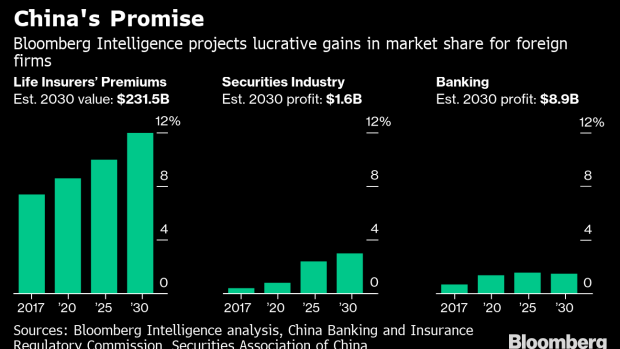Jun 18, 2019
In Trade War Shadow, Wall Street Keeps Experts in China Busy
, Bloomberg News

(Bloomberg) -- The market for corporate advice is booming in China, but it isn’t necessarily for guiding businesses through the minefields of the U.S. trade war.
Lawyers, consultants and recruiters say they’re busier than ever working with global financial companies trying to make the most out of China’s unprecedented opening of its banking, insurance and securities sectors. Questions range from the mundane, like how to find office space, to the more esoteric, like how to interpret senior officials’ rhetoric.
Belying the sometimes heated exchanges between U.S. President Donald Trump and his Chinese counterparts, Beijing has remained steadfast in its commitment to leveling the $44 trillion financial-industry playing field. That’s promising an enormous windfall for overseas companies -- provided they get their expansion strategies right.
“Clients are trying to figure out what heightened political tensions mean, but it certainly hasn’t dampened interest,” said Andrew Polk, founding partner of Beijing-based research company Trivium China. “Firms are looking at the next decade of business opportunity, and trying to get past the noise of the trade war.”
Trump said Tuesday that he had a “very good” phone conversation with Chinese counterpart Xi Jinping, their representatives are resuming trade talks and the two leaders will hold an “extended meeting” at the G-20 summit next week in Japan.
With China promising to allow foreign players to take full ownership of local joint ventures starting in 2021, lawyers and consultants are fielding questions about the optimal time to apply for permission to purchase majority control. Potential investors are also seeking clarity on whether and how they can move money in and out of China, as well as what legal structures are most appropriate and what the tax rules are.
Fund managers, meanwhile, often seek guidance on how to trade onshore commodity futures and execute trading strategies that incorporate hedging -- methods that became trickier after China cracked down on short-selling in 2015.
Polk said Trivium has doubled its research staff over the past few months, in part because financial-sector opening is fueling demand for its services. Oliver Wyman nearly doubled graduate recruitment at its Shanghai office last year and has accelerated its hiring process to cope with demand, said Peter Reynolds, head of Greater China. The consulting firm now holds competitions where winners are fast-tracked through the interview process.
Office Space
One indicator of the scope of financial companies’ China expansion plans is their need for office space.
Fion Zhang, who has been leasing office space in Shanghai for 18 years, said foreign financial institutions are hunting for larger premises. Many overseas clients are planning to increase their floor space by least 20%, said Zhang, CBRE Group Inc.’s head of office services in eastern China. Some more than doubled the size of their previous leases at the end of 2018.
“These foreign companies are not irrational -- even 20 additional square meters would go through a long compliance procedure,” she said. “Such a desire for space is a strong vote of confidence.”
While corners of China’s financial industry have been open to foreigners for more than a decade, a multitude of administrative hurdles reduced them to being bit players. That’s changing now, with companies from UBS Group AG to JPMorgan Chase & Co. and Nomura Holdings Inc. granted control of their onshore joint ventures.
‘Feeling the Stones’
What’s surprised some observers -- in an environment marked by clashes between China and the U.S. across a number of fronts -- is that Beijing hasn’t wavered in its determination to liberalize the financial industry. But with the wider array of available options comes increased uncertainty about the evolution of rules and laws governing the process.
“One challenge we have is that foreign firms often want to see clear rules and laws before they make their plans,” said Natasha Xie, a Shanghai-based partner at JunHe LLP. “But a lot of things happen very fast here and there is a degree of ‘feeling the stones to cross the river.”’
Hubert Tse, partner at Boss & Young law firm in Shanghai, points to one of his clients, which is one of the world’s largest fund managers. The firm, which he declined to name citing client confidentiality, set up shop in China in 2014 and for the first three years was fairly quiet, he said.
That started changing in the past 18 months, with Tse being asked to regularly meet with a range of senior executives as the firm stepped up its expansion in China. Tse said he’s providing advice on everything from what approach competitors have taken to what potential regulatory changes the client should anticipate.
“In the past, having a China presence was nice but it would take a lot of time and persuasion to make firms actually commit investment,” said Tse, who has advised global financial institutions in China for more than 15 years. “Now it’s completely different.”
(Updates with trade talks in fifth paragraph. A previous version of this story corrected CBRE’s name.)
To contact Bloomberg News staff for this story: Jun Luo in Shanghai at jluo6@bloomberg.net;Lucille Liu in Beijing at xliu621@bloomberg.net;Emma Dong in Shanghai at edong10@bloomberg.net
To contact the editors responsible for this story: Sam Mamudi at smamudi@bloomberg.net, Jeanette Rodrigues, Philip Lagerkranser
©2019 Bloomberg L.P.


